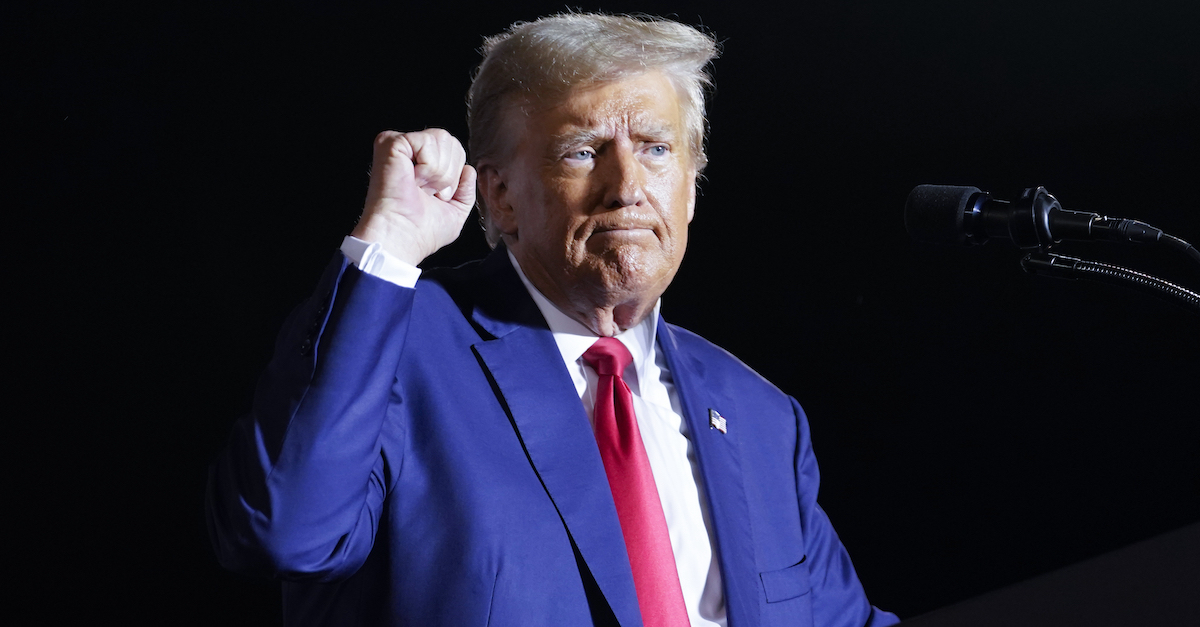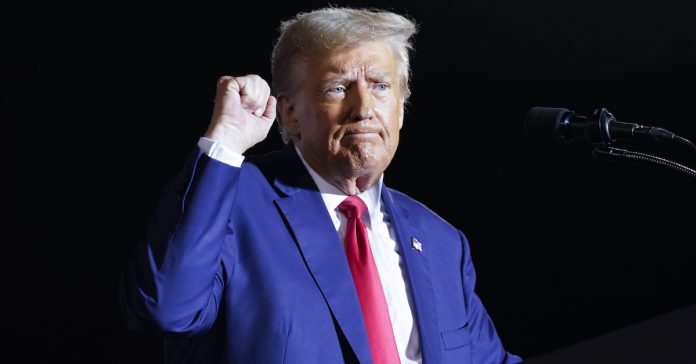
Former President Donald Trump speaks at a campaign rally in Hialeah, Fla., Wednesday, Nov. 8, 2023. (AP Photo/Lynne Sladky)
In one of numerous 14th Amendment challenges seeking to disqualify Donald Trump from running for president in 2024, the Minnesota Supreme Court declined Wednesday to boot former president from the March 5, 2024 presidential nomination primary while leaving the door open for potential general election disqualification under the insurrection clause at a later date.
The state high court said that after hearing from Minnesota Secretary of State Steve Simon (DFL), the Minnesota GOP, and Trump, it determined that nominating “a candidate who is ineligible to hold office” through an internal party election is a different story than having Trump’s name on the 2024 general election ballot.
Petitioners, former Minnesota Secretary of State Joan Growe (D), former Minnesota Supreme Court Justice Paul H. Anderson, and others represented by Free Speech for People (a non-profit group founded when the U.S. Supreme Court decided Citizens United v. FEC), did have standing to sue, but they didn’t overcome the language of section 204B.44(a), the high court ruled.
Section 204B.44(a) says [emphasis ours] “[a]ny individual may file a petition in the manner provided in this section for the correction of any of the following errors, omissions, or wrongful acts which have occurred or are about to occur.”
In the court’s view, the “only issue ripe” for decision was whether including Trump’s name on the presidential primary ballot was a correctable error.
“With respect to the only ripe issue before us at this time, we conclude that under section 204B.44, there is no ‘error’ to correct here as to the presidential primary election if former President Trump’s name is included on the presidential primary ballot after the Chair of the Republican Party of Minnesota provides his name to the Secretary of State, notwithstanding petitioners’ claim that former President Trump is disqualified from holding office under Section 3 of the Fourteenth Amendment,” the order said. “The Legislature enacted the presidential nomination primary process to allow major political parties to select delegates to the national conventions of those parties; at those conventions the selected delegates will cast votes along with delegates from all of the other states and territories and choose a presidential candidate who will subsequently appear on general election ballots.”
Even though the secretary of state and election officials “administer the mechanics of the election,” the court continued, “winning the presidential nomination primary does not place the person on the general election ballot as a candidate for President of the United States,” and there’s “no state statute that prohibits a major political party from placing on the presidential nomination primary ballot, or sending delegates to the national convention supporting, a candidate who is ineligible to hold office.”
Because the placing of Trump’s name on the Nov. 5, 2024, general election ballot is not “about to occur” and because there was “no error to correct here as to the presidential nomination primary,” the September petition was dismissed with a caveat. The petition was dismissed without prejudice, meaning it can be filed again, as to the general election claim that Trump should be barred from holding office under the insurrection clause of the 14th Amendment. When that issue is ripe, which would be if or when Trump’s name actually is on the general election ballot, petitioners will presumably take the issue back to court.
Law&Crime reached out to Free Speech for People legal director Ron Fein for comment.
Read the order here.
Have a tip we should know? [email protected]

